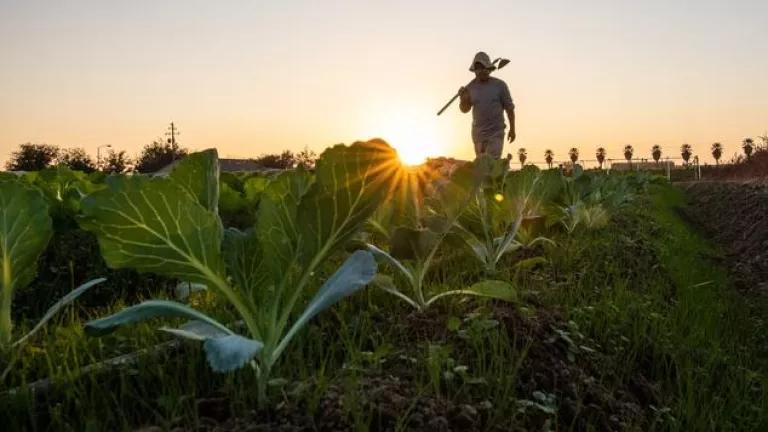CA's New Scoping Plan Affirms Organic Ag as Climate Solution
The first-ever inclusion of organic farming in state climate policy.

California’s newly updated 2022 Climate Scoping Plan, which will serve as the state’s roadmap for ratcheting down greenhouse gas emissions to achieve climate neutrality by 2045, sets a goal of expanding organic agriculture in California to 20% of cultivated acres (about 65,000 additional acres) by 2045. It also includes commitments to expand research on the climate impacts of pesticides and reduce synthetic pesticide use, and expresses support for an expansion of sustainable pest management strategies. Once again, California puts itself in a leadership position: this is the first time organic agriculture has been formally included in state-level climate policy strategy (and the first time California’s climate scoping plan includes goals for natural and working lands, including agricultural lands.)
Given California’s outsize influence as a farm state, this is an important expansion to the state’s climate strategy approach and a clear recognition that agriculture has a role to play in mitigating climate change. The Air Resources Board affirmed the essential role of organic farming and ranching as a nature-based climate solution with its final approval vote yesterday.
Transforming California’s massive agriculture sector away from extractive practices and toward climate-friendly strategies is essential as farmers struggle with extreme weather events like drought and wildfires and as food supply chains become much less reliable in the face of various stressors. This Scoping Plan affirms the importance of not only implementing climate mitigation and resilience strategies as quickly as possible, but also simultaneously investing in healthier farming practices that protect farmworkers and their communities. Meeting both of these challenges requires the wholesale adoption of agricultural systems that reduce reliance on fossil fuel-intensive inputs like synthetic fertilizers and pesticides; meaningfully and equitably addressing emissions from animal agriculture; and prioritizing soil health.
This Scoping Plan recognizes that certified organic farming, informed by decades of research and Indigenous knowledge and practices, is the most time-tested and readily available option for the state. Organic farmers and ranchers build healthy soil, do not rely on synthetic inputs, and protect biodiversity, all of which are essential to increasing resilience in the face of climate change and lowering the climate footprint of food and fiber production. Advocates, including NRDC, had called for more ambitious commitment and a faster timeline in order for California’s scoping plan to meet the urgency of the moment. We will now be looking to the implementing agencies and the legislature to ensure that these plans are brought to fruition as quickly as possible.
Though the Scoping Plan did not include firm, timebound commitments related to pesticide use reduction beyond the organic goal, it is heartening to know that California will be taking a serious look at the climate - and health - impacts of these harmful chemicals and continue to collaborate with the Departments of Food and Agriculture and Pesticide Regulation.
As 2022 comes to a close, there is a lot to celebrate in California when it comes to prioritizing organic agriculture as a climate and health solution. This year, the Department of Food and Agriculture set into motion $25.5M in grant funding through its Farm to School program, which gives applicants extra resources if they source from local organic producers. The state also funded a $5M pilot organic transition program; when rolled out in 2023, it will give historically underserved producers a much needed opportunity to access grants and technical assistance to reduce the financial risk that is often part of the three-year road to organic certification. This state funding will complement the rollout of the U.S. Department of Agriculture’s $300 million Organic Transition Initiative, which will be led by California’s CCOF in the southwest. Finally, we look forward to the release of the Sustainable Pest Management Roadmap in January, which will give the state a much needed refresher on its approach to pesticide use and regulation.


